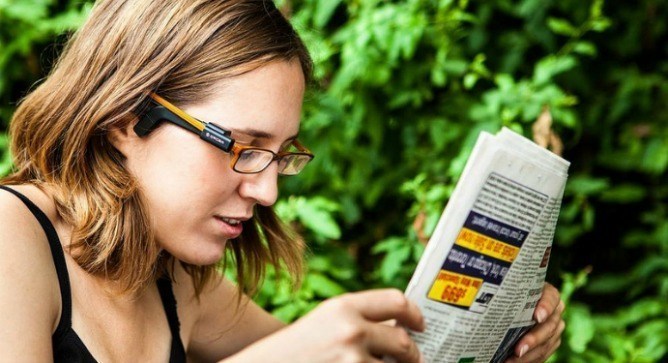Artificial vision device helps blind 'read' faces

Researchers at the University of California, Davis have developed a new device allowing people with serious visual impairment to 'read' and recognise faces.
The Orcam My Eye clips onto the arm of a pair of glasses and uses a miniature camera to process what it sees through a bone-conduction earpiece. Users activate the device by pointing to an object or text, tapping it or pressing a trigger button, the devices then reading out the text or describing the objects stored in its memory, such as credit cards or banknotes.
Similarly, the faces of people the user has previously met are stored by the unit, and their names are announced once in the OrCam MyEye's view.
Results from a 12-person pilot study showed significant improvement in various daily tasks when wearing the Orcam My Eye in people with visual acuity of less than 20/200.
The study is the first to analyse the device’s efficacy and ease of use in people with low vision – a condition that affects around 246 million people worldwide.
The study tested participants’ performance in a range of common activities, ranging from recognising products to reading emails. A point was earned for the completion of each item with a total possible score of 10.
Initial observation without the device returned an average scored of 2.5 out of 10. After a 90- to 120-training session with the device, the average score improved significantly to 9.5 out of 10. After a week of wearing the device, the average score increased to 9.8 out of 10.
Seven of the participants used other low-vision aids such as magnifying glasses. Their initial average of 6 out of 10 improved to 9.7.
"While there have been many advances in eye care, the options for assistance in completing daily tasks are limited and cumbersome," said Elad Moisseiev, a vitreoretinal surgeon and study lead. "This represents a new step in the evolution of assistance devices for people with low vision, giving them hope for improving their functionality, independence and quality of life."
So-called 'low vision' is a serious loss of eyesight that makes everyday tasks such as reading, writing or recognising faces difficult, and cannot be corrected with glasses or contact lenses. Current solutions include hand-held magnifiers, tele-microscopic glasses and computer magnifiers. However, these devices are typically bulky or not readily portable.
Many other companies are working on digital products for the visually impaired.
Pixium Vision’s IRIS II bionic vision system includes a set of goggles that records outside sensory information and relays it to an epi-retinal implant, which stimulates the nerve cells of the inner retina and relays signals to the optic nerve.
In June, a clinical trial investigating the use of the IRIS II in inherited eye disorders was approved by the UK’s Medicines and Healthcare products Regulatory Agency (MHRA). The trial will involve sites across France, Germany, Austria and the UK.











